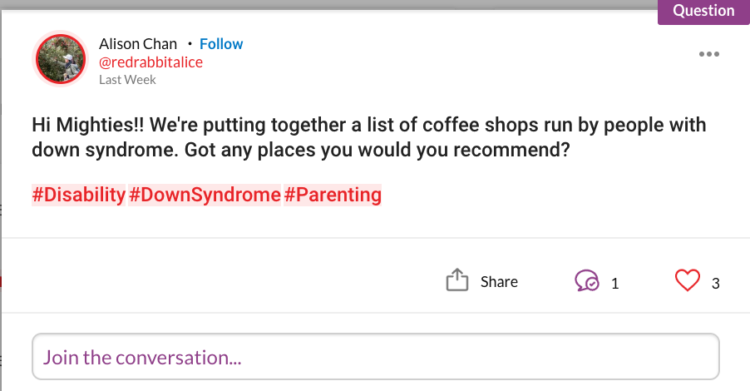We were doing great. Frankie, my 3-year-old daughter with Down syndrome, was rocking the school thing. At nearly every school pick-up I was told, “She had a great day!” and she was the virtual mayor of the hallways. She was drawing circles like a boss, taking those stairs with alternating feet and we were even hearing a lot more speech lately. I felt like we were in a really good place.
And then the progress reports came.
Her teacher called to prepare me. “I don’t want you to panic,” she said, “I don’t feel that the testing is accurate, it relies on verbal communication and Frankie was distracted. There is one age equivalency in particular…” “Oh, I know,” I had said at the time. By now I just let these things roll off my back.
But then I sat down to read it. Page after page on how my little girl was not measuring up. Goals that were not met. Distraction. Self-directed behavior. And that age equivalency? One area had her at 9 months. She’s almost 4! Needless to say, it didn’t roll off my back nearly as easily as I claimed it would.
Join in the conversation. Can you answer the question below?
Like many parents of children with disabilities, I’ve been through this a few times. And every time I’m reminded that this is a process. But I have realized there are steps that help take the edge off just a little bit.
So here is my take on how to read a progress report without freaking out:
1. Read them thoroughly.
I know it hurts, but you have to read them carefully. They will be the documents that inform the decision makers throughout your child’s educational career. They deserve your attention. Learn the lingo and what it “really” means and ask questions about what you don’t understand.
2. Feel your feelings.
It’s OK to cry, to feel sad and angry and frustrated. It is virtually impossible to separate your emotions from your child’s progress. You have a vested interest in their success from the moment they are born and we are often fiercely protective of them. Maybe even more so when your child has disabilities. In fact, I think your emotions can be a valuable spark in starting the fire necessary to sustain lifelong advocacy for your child. So give your feelings an outlet, whether it be to a partner or fellow parent or trusted friend.
3. Leave them alone.
Walk away from the reports, shove them in the drawer and forget about them for a while. Give yourself some time and distance. Remind yourself that there is a whole life outside of the world of special education and that your child’s diagnosis does not define them. Live in the world that does not revolve around therapies and special education and progress reports for as long as you need to and then revisit the reports when you’re ready.
4. Accept their validity.
It’s true that these reports only tell part of your child’s story. You may disagree with the details, but it’s important to accept that they reflect the experience that your child’s teachers and therapists have had with him or her. Maybe you feel the reports do not accurately describe your child, but unless you are working with a team that is intentionally malicious and falsifying evaluations, then these reports are a snapshot of him or her that you can learn something from.
5. Get some perspective.
Meet with your child’s teachers to get the bigger picture. Often the reports don’t detail the actual progress your child has made. They will measure your child’s success against “the norm” but not how he or she is doing according to his or her own path. Ask their teacher to tell you about your child’s strengths within the classroom. Ask about what they add to the environment. And then talk about how you both can support him or her consistently, both in school and at home.
6. Recover your passion.
After reading Frankie’s most recent reports I felt… tired. I was frustrated and exhausted thinking that all of this work we were putting in was making no difference at all. In fact, seeing as I thought we were in a good place before, I felt like the reports were a giant step backwards. I didn’t see any point in continuing to push and advocate; I felt like giving up.
It took a few days of feeling like this before I snapped out of it. But I met with her teachers and talked with some friends, who all gave me a much needed perspective. Then one day later that week, when I went to pick Frankie up from school, she ran to me with a huge smile and melted into my arms in a big hug. I was reminded that she is worth every single ounce of my effort and that she deserves to have me in her corner, fighting to clear a path toward success for her. The next week I attended an Advocacy in Education seminar and my passion was reignited.
This will undoubtedly look different for everyone. But I think it’s important to find that which reminds you that the only way is forward. Not helping your child to progress toward success is not really even an option.
7. Make a plan.
Frankie’s reports raised a red flag for me regarding her classroom placement. Speaking to her teachers made me realize we were having the same concerns. Moving forward, we have made a plan to make a few adjustments, both at home and at school, and we will observe her for a while to see if they make a difference. In the meantime, we are working on securing another placement should we decide to move her. Nothing is set in stone — I’ve learned it is so important to remain flexible.
Whatever you decide to do, remember that though they may seem hurtful at the time, progress reports are actually a valuable tool for you to discover what works best for your child and to ultimately get him or her the supports they need to thrive.


